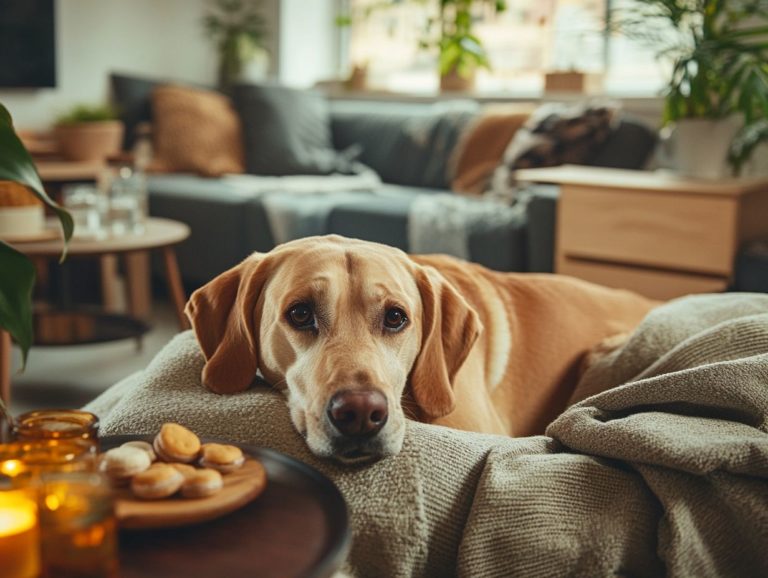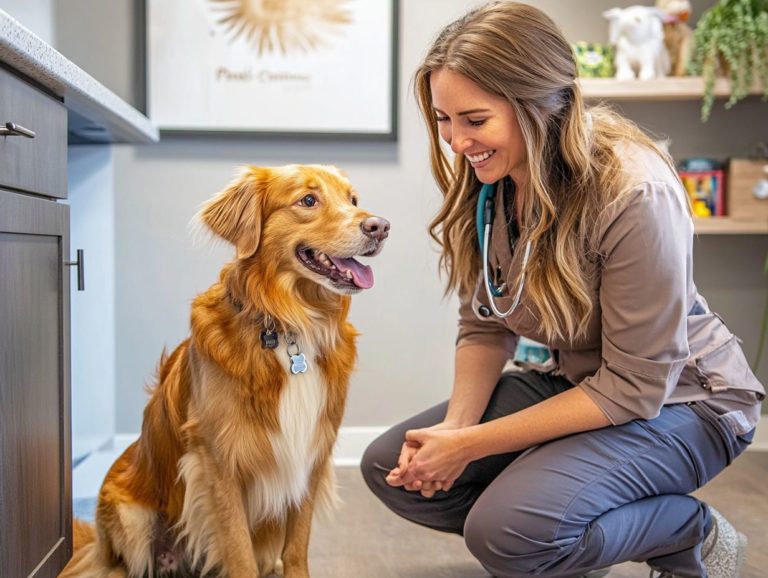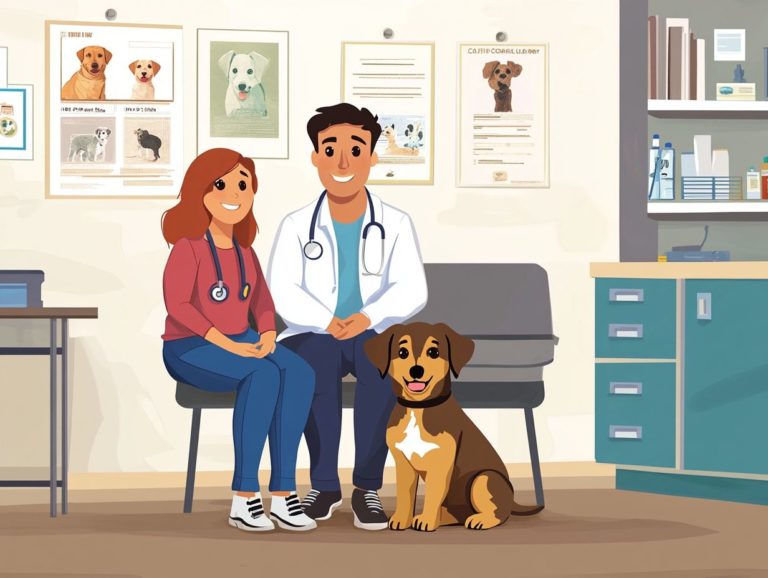Pet Anxiety Treatment Plans: Working with Experts
Pets, much like humans, can experience anxiety. Recognizing this is the crucial first step in helping them feel safe and secure.
This article delves into the causes and symptoms of pet anxiety. It provides valuable insights on collaborating with veterinarians and pet behaviorists for effective assessment and treatment plans.
It examines a range of behavior modification techniques and alternative remedies. This guides you in crafting a comprehensive strategy tailored to your furry companion’s needs.
Uncover methods to enhance your pet’s well-being and restore harmony in your home.
Contents
- Key Takeaways:
- Understanding Pet Anxiety
- Working with a Veterinarian
- Collaborating with a Pet Behaviorist
- Behavior Modification Techniques
- Alternative Treatment Options
- Creating a Comprehensive Treatment Plan
- Frequently Asked Questions
- 1. What is pet anxiety and how can working with experts help in treating it?
- 2. What types of experts can help with pet anxiety treatment plans?
- 3. How can I find a reputable expert to help with my pet’s anxiety?
- 4. What can I expect from a pet anxiety treatment plan with an expert?
- 5. Are there any natural remedies that veterinary professionals recommend for pet anxiety?
- 6. How long does it take for a pet anxiety treatment plan to show results?
Key Takeaways:
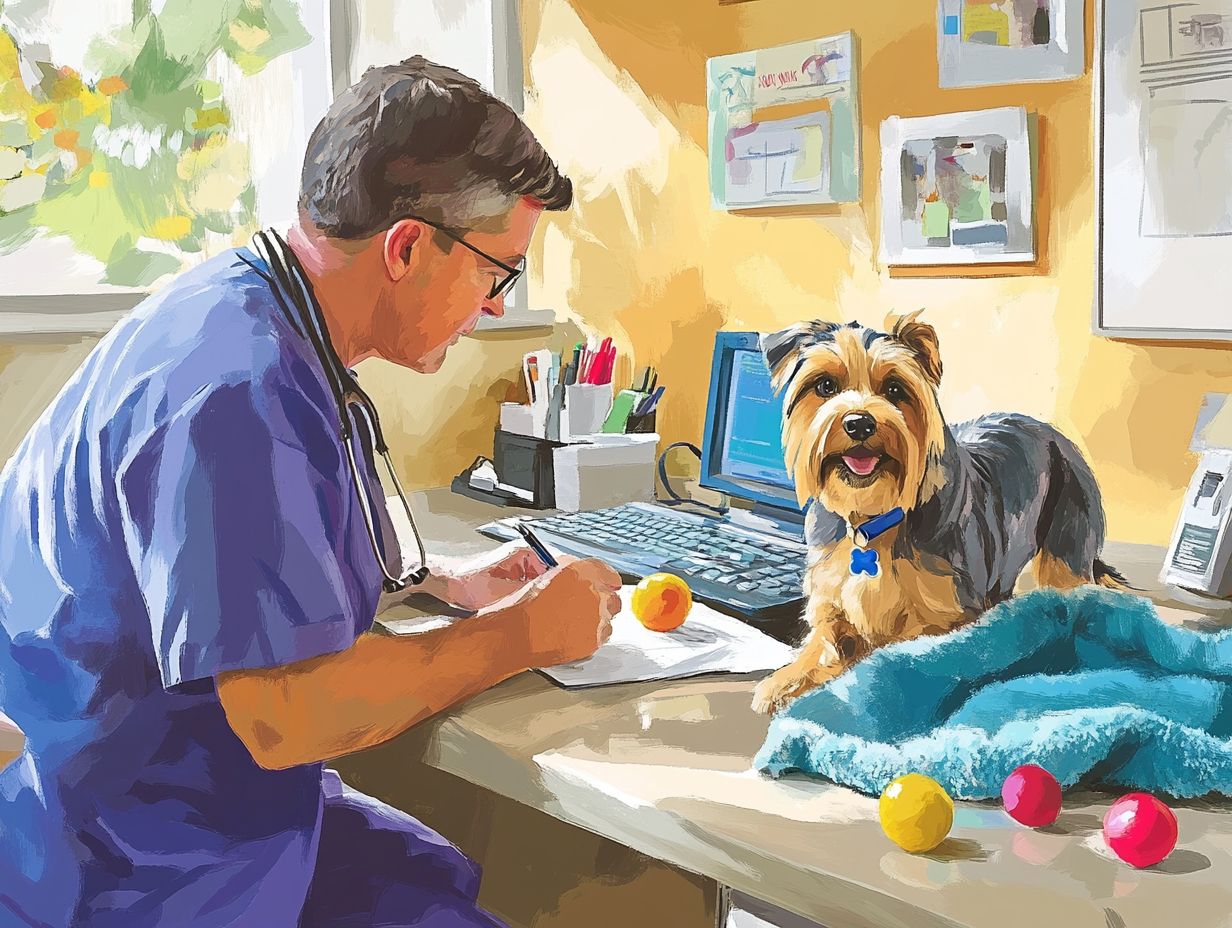
- Collaborating with experts is crucial in treating pet anxiety.
- Work with a veterinarian to assess the root cause and explore treatment options.
- A pet behaviorist provides valuable behavior modification techniques.
Understanding Pet Anxiety
Understanding pet anxiety is essential for you as a dog owner. It encompasses a variety of issues that can impact your canine companion.
Separation anxiety arises when your dog is left alone. Fear-related anxiety can be triggered by loud noises like thunderstorms. Recognizing the symptoms of anxiety can pave the way for effective treatments.
Cognitive dysfunction syndrome can also cause anxiety-related behaviors. It often manifests as physical symptoms. By diving into the common causes of these anxiety disorders, you can gain valuable insights into your dog s mental health needs and take proactive steps to prevent anxiety.
Causes and Symptoms
The causes of dog anxiety are multifaceted. They arise from a blend of genetics, environment, and past experiences.
You may notice your dog displaying physical signs of distress, such as excessive barking or gnawing on inappropriate items. Recognizing specific triggers like thunderous storms or the crackle of fireworks can help you create effective management strategies.
Anxiety may spike during separation from their owners. This situation can worsen without proper socialization approaches. Spotting these challenges early is key for your dog s happiness!
You can make environmental adjustments, like establishing a cozy safe space or utilizing calming aids. These can soothe your dog s anxiety and promote a more tranquil state of mind.
Working with a Veterinarian
Collaborating with a veterinarian is crucial for managing your dog’s anxiety. They offer a thorough evaluation of your dog’s behavior and can recommend tailored treatment options that address your pet’s unique needs, including the importance of professional guidance in pet anxiety.
Assessment and Treatment Options
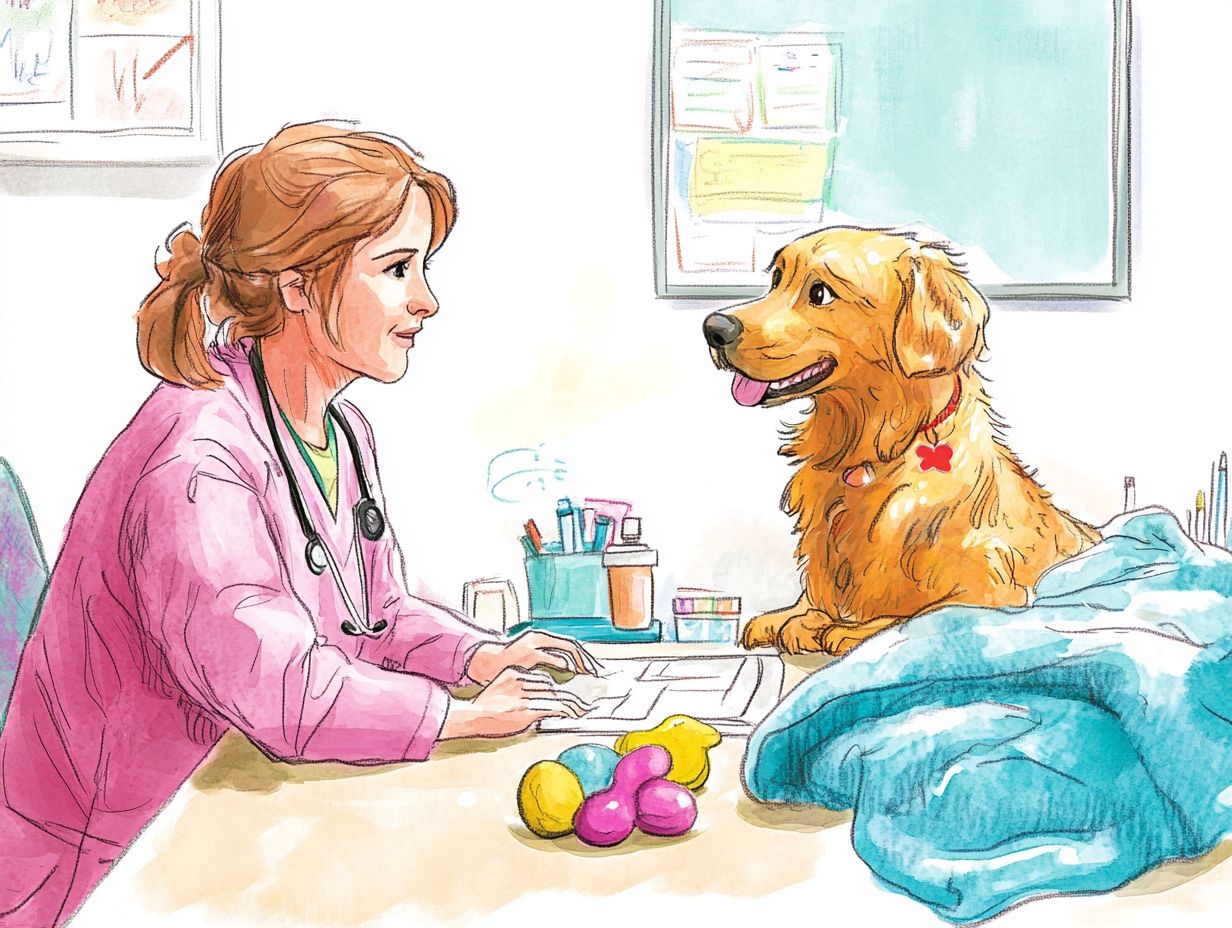
Assessment and treatment options for your dog’s anxiety thrive on a collaborative approach between you and your veterinarian. For additional support, consider reaching out to the top pet anxiety experts in your area. This partnership ensures that the treatment plan is comprehensive and effective.
Veterinarians typically start with a thorough evaluation. This includes behavioral assessments, reviews of medical history, and, if necessary, diagnostic tests to pinpoint any underlying health issues.
Once a clear understanding is established, they can recommend suitable treatment options, such as anxiety medications like SSRIs or clomipramine. These are designed to target the neurochemical imbalances linked to anxiety disorders.
Recognize that there’s no one-size-fits-all solution. Individualized treatment plans tailored to your dog’s specific needs are crucial. For more insight, understanding the timeline of pet anxiety treatment and seeking professional guidance can significantly enhance the effectiveness of behavioral interventions.
Collaborating with a Pet Behaviorist
Collaborating with a pet behaviorist offers you invaluable support in crafting effective behavior modification strategies for dogs grappling with anxiety-related issues, especially when you consider the different types of pet anxiety experts.
This partnership enables you to implement tailored training techniques that foster anxiety relief. Ensure your canine companion receives the specific care they need.
Take the first step in addressing your pet s anxiety by consulting a veterinarian or behaviorist today!
Behavior Modification Techniques
Behavior modification techniques are crucial for managing your dog’s anxiety. They incorporate training strategies like desensitization and positive reinforcement to cultivate a calm and confident companion.
These approaches emphasize gradually exposing your dog to specific stimuli that trigger their fears. This allows them to acclimate without overwhelming distress. For instance, during desensitization, you might introduce your dog to a trigger, such as loud noises, at a volume that doesn t provoke anxiety.
Pair this with positive reinforcement. Reward your dog with treats or affection to create positive connections with previously feared situations.
Over time, these techniques foster resilience and reduce anxiety, enabling your dog to respond more calmly to their triggers. This enhances their overall well-being and enriches their enjoyment of life.
Alternative Treatment Options
Alternative treatment options for dog anxiety are becoming a favored choice among pet owners seeking natural therapies and calming products to ease their dogs anxiety-related behaviors.
Embracing these methods reflects a commitment to your pet s well-being and opens the door to a more harmonious life together.
Exploring Natural Remedies and Therapies
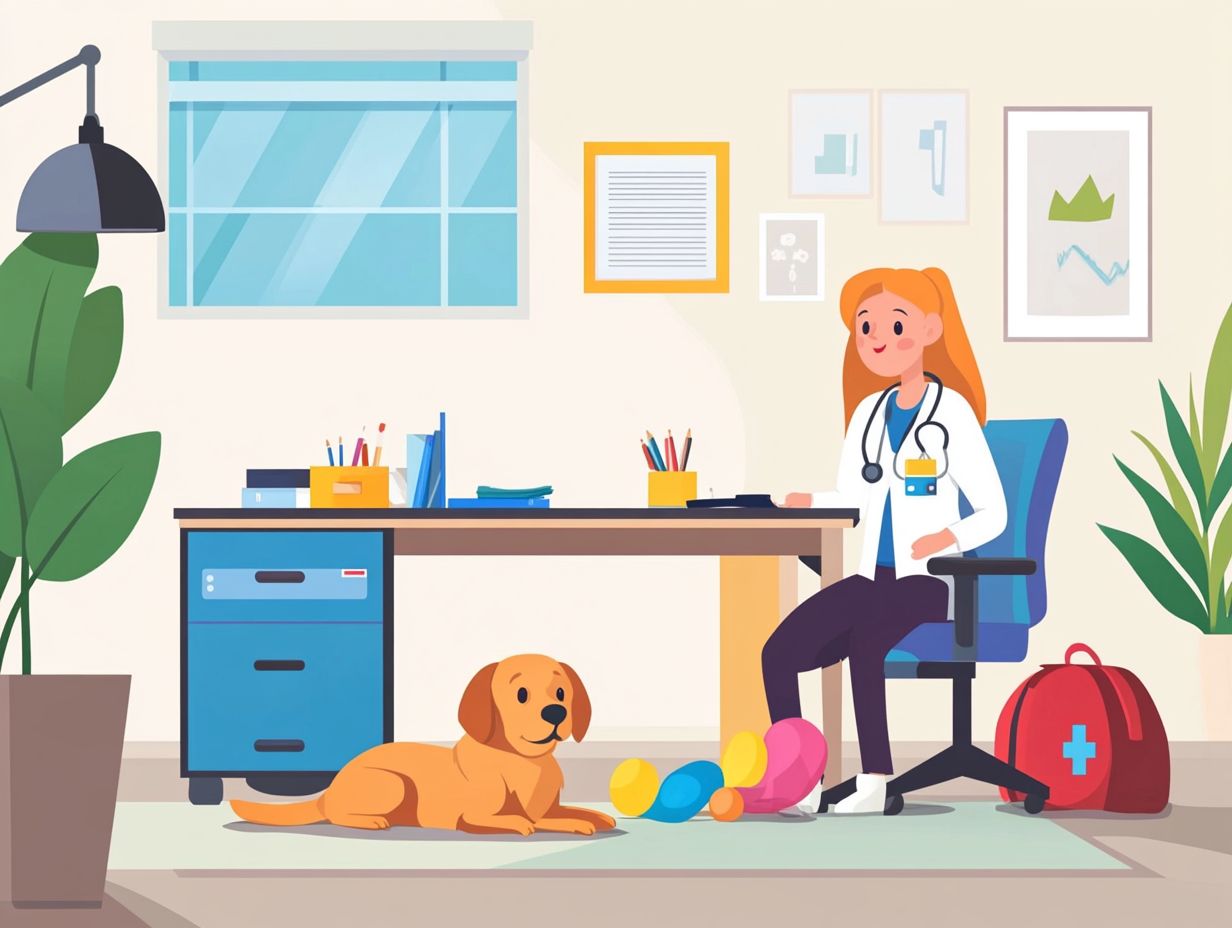
Discover the power of natural remedies to calm your furry friend! Exploring these options can help you consider solutions like:
- CBD oil
- Chamomile
- Lavender
- Valerian root
Each of these has unique properties that contribute to a soothing environment for anxious dogs. Research suggests that CBD oil from hemp could effectively reduce stress by interacting with the endocannabinoid system, a system in the body that helps regulate mood and stress. Many user testimonials rave about its calming effects.
Veterinary care experts often recommend these therapies alongside traditional treatments. This highlights the value of a holistic approach to managing anxiety. To make informed choices, consider reviewing the top questions to ask your pet anxiety specialist. Incorporating these remedies gives you a range of choices, ensuring you can tailor a strategy that best suits your furry companion.
Creating a Comprehensive Treatment Plan
Crafting a comprehensive treatment plan for your dog’s anxiety requires a multifaceted approach. You ll want to blend various strategies to ensure optimal management. This means incorporating training, counterconditioning, exercise, and balanced nutrition to alleviate anxiety and promote well-being.
Combining Approaches for Best Results
Combining various approaches for optimal results in anxiety management can significantly enhance the effectiveness of your treatment plan, ensuring that both behavioral and environmental factors are thoroughly addressed.
This multifaceted strategy creates a comprehensive framework that allows for tailored solutions based on your unique needs. For example, incorporating targeted training strategies can help reinforce positive behaviors, while professional support offers an expert perspective on any underlying issues you may encounter.
Consider the case of a rescue dog named Max. His severe anxiety was alleviated through a blend of desensitization techniques and structured play sessions, all under the guidance of a certified behaviorist. By implementing a consistent routine, you too can markedly reduce stress triggers, paving the way for a calmer, more balanced canine companion.
Frequently Asked Questions
1. What is pet anxiety and how can working with experts help in treating it?

Pet anxiety is the stress and fear pets feel in certain situations. Working with experts, like veterinarians or animal behaviorists, helps identify the cause and create a treatment plan based on a comprehensive approach.
2. What types of experts can help with pet anxiety treatment plans?
Veterinarians, certified animal behaviorists, trainers, and holistic vets can assist with pet anxiety. For a comprehensive approach, consider the role of veterinary advice in managing pet anxiety and choose an expert with experience in this area.
3. How can I find a reputable expert to help with my pet’s anxiety?
Ask your veterinarian or fellow pet owners for recommendations. You can also research online for certified experts with positive reviews.
4. What can I expect from a pet anxiety treatment plan with an expert?
A treatment plan begins with an assessment of your pet’s behavior. It usually includes a personalized approach and follow-up sessions to track progress, and knowing when to consult a professional for pet anxiety can be crucial in this process.
5. Are there any natural remedies that veterinary professionals recommend for pet anxiety?
Yes, experts recommend natural remedies like herbal supplements or aromatherapy. Always consult an expert before trying new remedies to ensure safety and effectiveness.
6. How long does it take for a pet anxiety treatment plan to show results?
The time for a plan to show results varies based on anxiety severity. Some pets may improve within weeks, while others might take longer; be patient and follow expert guidance on pet anxiety costs for the best outcome!



